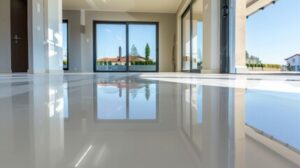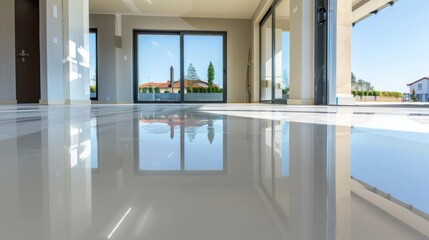Epoxy floor coatings are ideal for industrial spaces that require durability and chemical resistance. They’re also a popular choice for arenas and stadiums because of their attractive finish and slip-resistant properties.
The process of applying an epoxy floor takes time and expertise. The underlying concrete must be thoroughly cleaned and primed before the resins and hardeners can be mixed and applied. Contact Nashville Epoxy Flooring for professional help.
Epoxy floors are a durable choice for any facility. They can withstand heavy traffic and wheeled vehicles like forklifts, and they are resistant to most chemicals. However, the durability of epoxy flooring depends on how it is maintained and cared for.
One of the most important factors that impact the lifespan of an epoxy floor is how it is prepared before installation. It’s crucial that the underlying concrete surface is surveyed and repaired. It must be free of cracks, pits, low spots, spalling, stains and dusting. Additionally, the surface needs to be lightly etched and prepared with a concrete etcher. These steps can be performed by a professional contractor, and they will ensure that your new epoxy floor is properly installed.
After an epoxy coating is applied, it will need to be maintained regularly. A regular maintenance program can help your floors last longer and keep them looking beautiful. This may include sweeping, mopping and scrubbing. Additionally, it is recommended that you use a neutral cleaner instead of acidic or alkaline solutions, which can damage the epoxy and dull its shine.
Additionally, it’s important to clean up spills promptly to avoid staining and damage to the epoxy. It’s also a good idea to regularly wax your floors to add extra protection and maintain their appearance.
Although epoxy floors are highly durable, they can still be scratched and dented. To reduce the risk of these issues, it’s a good idea to ask your epoxy flooring contractor about a clear topcoat with enhanced scuff/scratch resistance.
Other important factors that can impact the durability of your epoxy flooring are how much foot and vehicle traffic it receives, and what chemicals it is exposed to. It’s also a good idea for facility managers to implement specialized spill response techniques in order to minimize chemical and oil leaks that could damage the floor.
Other ways to make your epoxy floor more durable are to use a heavier gauge, more durable epoxy coat and to consider adding a decorative element, such as metallic flakes or pigments to the final coating. This will give the floor a richer, more customized look that will complement your space.
Easy maintenance
While epoxy is a bit more expensive than quick-fix alternatives, it offers superior durability and requires less maintenance. The smooth surface prevents dirt, grime, and other debris from penetrating and is easy to clean using a broom or shop vac. Epoxy is also water-resistant and can be made anti-slip, making it ideal for high-traffic venues like restaurants and bars.
To get the most out of your epoxy floor coating, you must make sure that the concrete is in good condition and free from cracks or chips. Ideally, the concrete should be new, but even older slabs can work if they are patched and degreased before application. It is also important to etch the concrete to prepare it for the epoxy coating. This can be done manually or mechanically with grinding or shot blasting. Once the floor has been prepared, a primer can be applied to enhance the bond between the concrete and the epoxy. Once the primer has dried, the epoxy can be mixed and then applied to the floor. This process can take several days to complete, during which the floor must be kept clear of dust and other contaminants.
If you choose to apply the epoxy yourself, make sure that you follow the manufacturer’s instructions precisely. A skilled team of professionals can help ensure that the process is completed correctly, ensuring a long-lasting, durable finish. If you opt for a professional installation, be sure to ask about their warranty coverage and ongoing maintenance and repairs.
Epoxy floors are a cost-effective and practical solution for many different types of business. The durability, ease of maintenance, safety features, and customization options make it a great choice for restaurants, bars, warehouses, and more.
If you’re looking for a durable, functional, and attractive flooring option, consider epoxy flooring for your business. It’s easy to maintain and offers a variety of color and design options. With its added safety benefits and anti-slip properties, epoxy is a wise investment for any space. Contact a reputable epoxy flooring contractor to learn more and start planning your project today.
Aesthetics
Epoxy floor coatings are highly decorative, creating a sheen that is pleasing to the eye. They are also durable and provide a smooth surface that can be easily cleaned. This makes them an ideal choice for garages, other residential spaces, and commercial areas. The sheen of the epoxy also makes it easy to spot any spills or debris that might need attention, ensuring the floor stays looking good for as long as possible.
Epoxies are thick, resin-based paints that come in two parts that must be mixed before application. It is important to have an experienced professional apply the product. It’s also important to prepare the concrete floor correctly before applying the epoxy. This includes cleaning the area and repairing any cracks or holes in the concrete. It’s also a good idea to use an industrial vacuum with the proper filter to remove any dust particles that might end up in the final coat of epoxy.
Once the primer is applied and the floor has been cleaned, it’s time to mix the epoxy. It’s always a good idea to have multiple people help with the application process, as the epoxy has a relatively short “pot life” and will start to harden quickly. It’s also a good idea for each person to work on a different corner of the room to ensure that the epoxy is applied evenly.
After the epoxy is mixed, it can be applied to the floor using a roller or squeegee. It’s important to apply an even layer of the product and to wait for it to dry before applying a second coat. The drying time can vary depending on temperature, humidity, and air movement.
Some epoxy systems include colored flakes that are spread into the wet epoxy to create a speckled effect. These can be added to a variety of color blends to create unique flooring that is both attractive and professional-looking. Some epoxy systems also include metallic pigments that add a sense of depth and movement to the floor.
Once the epoxy is dry, it’s a good idea to let the area rest for about seven days before it’s used. It’s also important to avoid walking on the floor while it is still curing, as this can damage the surface.
Safety
An epoxy floor provides a safe and durable flooring solution in a wide variety of industrial settings. It creates an impenetrable non-porous seal that effectively guards against stains, dirt buildup and water damage. Those environments where chemical spills and other toxic substances may be encountered benefit from the fact that those chemicals will not be absorbed into the flooring material and are therefore easily cleaned.
Additionally, the seamless nature of an epoxy floor makes it highly unlikely to crack or chip under heavy foot traffic. In contrast, a cracked or damaged concrete floor can become dangerously uneven and pose falling hazards for those walking on it.
In addition to the protective surface of an epoxy coating, a wide variety of other safety-oriented features can be applied to your flooring system as well. For example, a high-gloss variant of the coating can be further enhanced with anti-slip additives, providing an additional layer of security for those working in wet or slippery conditions.
Aesthetically, a bright color palette can be used to delineate different work zones and walkways, increasing visibility throughout your facility and aiding in navigation. This visual clarity can be vital in large warehouses and manufacturing facilities, as it helps guide employees and visitors from one task to the next with a clear path of travel.
Specialized spill response techniques also help preserve the safety and beauty of an epoxy floor. For example, when faced with a chemical or oil spill, swift action is required to avoid irreparable damage to the coating and to prevent hazardous conditions for those in the vicinity. First, the spill should be soaked up with an oil-specific absorbent and shop towels. Next, the area should be treated with an eco-friendly degreaser compatible with epoxy surfaces. Following this treatment, a thorough rinse with water should be administered to eliminate any residual traces.
Other preventive measures to preserve your epoxy floor’s safety and durability include utilizing mats and rugs at primary entryways to reduce tracked-in dirt, as well as furniture pads to keep hard wheels or metal legs from gouging the surface when under load. In addition, a regular cleaning schedule that includes sweeping and mopping with a mild cleaner formulated for epoxy floors keeps the surface clean without dulling its lustrous appearance. Finally, addressing minor damage like hairline fractures and chips promptly with an epoxy repair kit further promotes the longevity of your floor’s safety and aesthetic quality.

